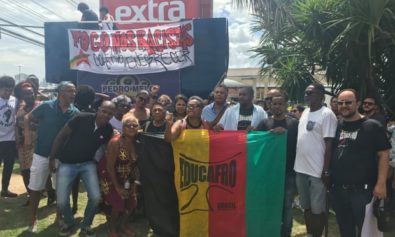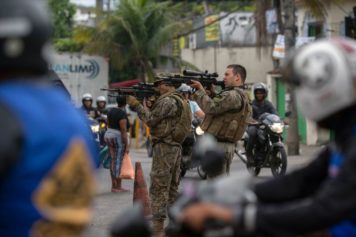Slavery still exists in Brazil. The Global Slavery Index reports an estimated 161,100 Brazilians are currently living in modern slavery. And between 1995 and 2015, nearly 50,000 Brazilians were released from conditions of slavery, many of them Afro-Brazilian.
Given recent measures taken by the nation’s embattled president, Michel Temer, such modern-day slavery will likely increase. This past week, Temer was behind the Brazilian labor ministry’s move to officially end the public publishing of its “dirty list” which blacklists companies that employ slave labor, denying them loans and restricting their product sales. The 14-year-old list — composed largely of big agricultural interests, many who successfully lobbied for its suspension in December 2014 — was reinstated in March three months after the Inter-American Court of Human Rights ordered Brazil to pay $5 million to 128 former farm workers enslaved between 1988 and 2000.
“It’s a debt peonage system they are never able to extract themselves from,” said James Early, a Latin America specialist, former director of Cultural Heritage Policy at the Smithsonian Institution and current board member of the Institute for Policy Studies. Early has traveled regularly to Brazil for the past four decades. He explained that those who are forced into labor and threatened by armed guards are “recruited from urban areas with the idea they will be able to sustain their lives when they get there and, instead, they find they are indebted for transportation, for clothing, for food.”
The new legal measure — along with now requiring government farm inspectors to obtain a police report — also changes the way slavery is defined from the inclusion of debt bondage, abusive conditions and hours, and violations of a worker’s health and dignity, to a simple limiting or restricting of a worker’s freedom of movement.
“Before, if a worker is sleeping with the pigs, has no water, and doesn’t receive a wage, the labor inspector says this is slave labor, even though the worker can leave the farm,” said Leonardo Sakamoto of the U.N. Voluntary Trust Fund on Contemporary Forms of Slavery, speaking with the Thomson Reuters Foundation in Brazil. Sakamoto also founded the independent reporting group Repórter Brasil. “But today, with this decree, this isn’t slavery anymore.”
Nonetheless, in a recent statement, the labor ministry maintained it is fully committed to preventing the forced labor of its citizens. “Combating slave labour is a permanent public policy of the state,” read the ministry’s statement.
However, critics say the recent move is an attempt by Temer to ensure big agribusiness support, given the series of ongoing votes on whether the controversial leader will face trial on numerous corruption charges. Temer is largely beholden to the powerful agribusiness caucus in the Brazilian Congress, the Frente Parlamentar da Agropecuária (FPA), for his political survival. In his recent Thomson Reuters’ interview, Sakamoto insisted, “This new decree is directly involved with Temer’s efforts to save his neck from the guillotine.”
Early clarified one can’t begin to understand the current situation in Brazil without relevant historical context. The last country to officially abolish slavery in the Western Hemisphere in 1888, Brazil’s history is fundamentally steeped in the economic exploitation of its Afro-descendants, a group constituting of over half of its population. The country has the ninth-largest gross domestic product and seventh-highest purchasing power in the world, noted Early, yet with “one of the greatest class divides in the world, which is fundamentally a racialized class divide, and nearly 3000 quilombos, or isolated African-descent communities, with a particular state of misery, dispossession and exploitation.”
In 1964, a U.S.-supported military coup overthrew Brazil’s elected government and its efforts to nationalize the profits of large companies and ensure a better quality of life for the country’s citizens. Characterizing such popular intentions as a “socialist threat,” the ensuing right-wing military regime continued to serve U.S. and big agribusiness interests for decades until a civilian government took office in 1985 and, again, began advocating for the general welfare of Brazilians.
More recently, this alignment of right-wing elite and U.S. interests was implicated in the thinly veiled regime change in the form of the impeachment of Brazil’s democratically-elected, left-of-center president, Dilma Rousseff, who advanced a more populist agenda.
“You have a coup that brings in all white males, and one of the first things they do is dismantle the Afro-descendant and women’s ministries and bring back these neoliberal paradigms of the privatization of public resources and concerns while lowering the role of the state in the social welfare, basic needs and aspirations of the majority of the population,” said Early, who traveled to Brazil with actor and international activist Danny Glover to personally meet with former-president Rousseff three months before her removal from office. “So this is the context in which we now see that Brazil is, once again, at the elite level trying to hide this type of slavery.”
Since the controversial measure was adopted on October 16, the international response has already caused Temer to reconsider, at least, in part. Within Brazil, a number of federal and labor prosecutors have issued a recommendation characterizing the decree as illegal and are threatening to revoke by legal challenge.
In addition to such challenges and the potential introduction of international sanctions, Early pointed out there are steps American citizens can take as well to exert an impact on a nation with the largest Afro-descendant population outside of Africa’s most populous country of Nigeria.
“The most important thing for US citizens is to become aware of how our stewards of government are complicit through their silence or their overt activity in support of these exploitive conditions,” said Early, noting the need to advocate for a more people-centered U.S.-Brazil relationship with the US State Department and in federal and state elections, especially given numerous states do direct business with Brazil. “There are multiple general implications for US citizens and particular implications for Afro-descendant citizens in the United States to hold ourselves and our policy stewards accountable.”


